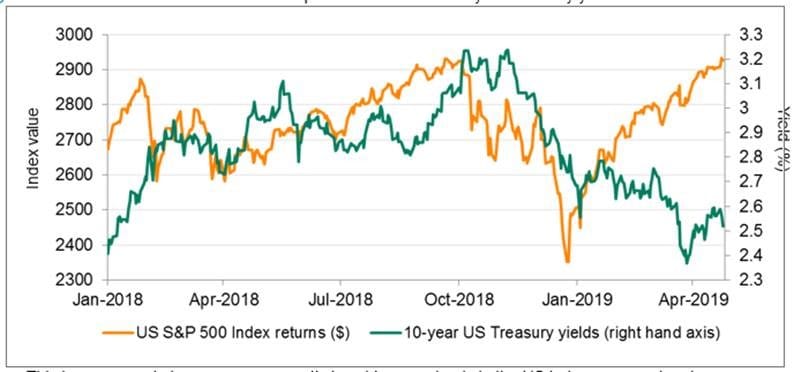
Since the beginning of 2019, equities have enjoyed a strong rally, which typically flags a risk-positive environment for investors. However, at the same time, bond yields have been falling (bond prices have been rising) – usually a sign of risk-aversion.
The drop can be felt in developed market, specially. In these, sovereign bond yields are at their lowest levels in years as traders ratchet up bets that major central banks will be easing. According to Bloomberg: “Yields in Australia and New Zealand dropped to record lows after a closely-watched part of the U.S. curve inverted on March as investors wager that the Federal Reserve will need to cut rates. Trading volumes in Treasury futures were double the norm during Asian trading, while Japan’s 10-year yields fell to the lowest since 2016.”
So, how should we interpret this apparent disconnect?
We have asked asset management expert Graham Bishop, Investment Director at Heartwood Investment Management, the asset management arm of Handelsbanken in the UK to find out the possible causes and consequences of this non-usual behaviour in all major investment markets, specially between sovereign bond yields and equities.
“This is an unusual phenomenon, currently in evidence not only in the US but across most major investment markets. Investor motives are often translucent at best, but we believe that the ‘jaws’ opening between bond yields and equities could signify bond investors sceptical about the outlook for global growth and the inflation cycle, alongside more optimistic equity investors,” the expert said.

Bishop also asks for caution until the markets stabilise or move again. “Against this backdrop, we remain cautious, maintaining our a short-duration stance in fixed income assets (less sensitive to interest rate changes) and a neutral position in equities,” he concluded.
Other voices, such as that of Jeffrey Hally, senior market analyst at Oanda Corp. in Singapore shares this cautiousness and how some countries are better prepared to palliate the negative outcome in the long-term. Likewise, he pointed out that while bond markets globally, along with dovish central banks, have been telling that a slowdown is on the way, some parts of the world will be better equipped than others to handle this. The U.S., for instance, can at least cut rates and apply monetary tools, while things could be worse for Europe and Japan, where they cannot.

Hernaldo Turrillo is a writer and author specialised in innovation, AI, DLT, SMEs, trading, investing and new trends in technology and business. He has been working for ztudium group since 2017. He is the editor of openbusinesscouncil.org, tradersdna.com, hedgethink.com, and writes regularly for intelligenthq.com, socialmediacouncil.eu. Hernaldo was born in Spain and finally settled in London, United Kingdom, after a few years of personal growth. Hernaldo finished his Journalism bachelor degree in the University of Seville, Spain, and began working as reporter in the newspaper, Europa Sur, writing about Politics and Society. He also worked as community manager and marketing advisor in Los Barrios, Spain. Innovation, technology, politics and economy are his main interests, with special focus on new trends and ethical projects. He enjoys finding himself getting lost in words, explaining what he understands from the world and helping others. Besides a journalist he is also a thinker and proactive in digital transformation strategies. Knowledge and ideas have no limits.













































